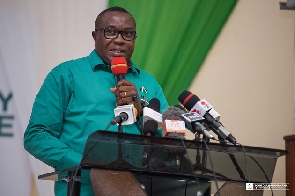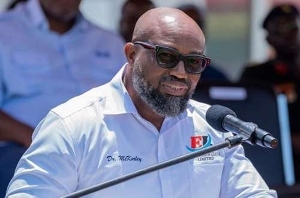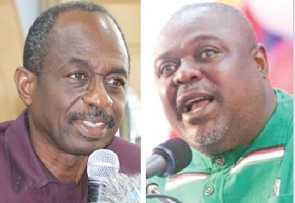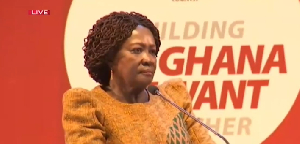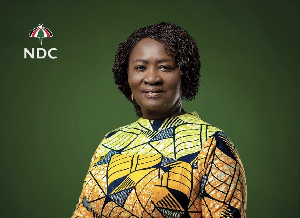As Electoral Commission of Ghana prepares to embark on voter registration for the 2020 general elections, some misguided or misinformed Ghanaians have started pointing figures at some Ghanaians calling them foreigners.
For instance, a cousin to the President of Ghana, Gabby Asare Otchere – Darko, a lawyer by profession did not understand why Ketu South should not record the highest voter population in Ghana.
You would agree with me that Ketu South has always been the target of the New Patriotic Party (NPP). Many supporters and sympathizers in NPP believe Ketu South voters’ roll is populated by non – Ghanaians.
It saddens me that our brothers and sisters, who because of political expediency believe this unwarranted, unjustified attack on Ketu South.
Who then is a Ghanaian?
Every Ghanaian citizen must know that he or she is a Ghanaian because the Constitution of Ghana says so.
I will produce Article 6 of the 1992 Constitution:
Article 6(1) Every person who, on the coming into force of this Constitution, is a citizen of Ghana by law shall continue to be a citizen of Ghana.
(2) Subject to the provisions of this Constitution, a person born in or outside Ghana after the coming into force of this Constitution, shall become a citizen of Ghana at the date of his birth if either of his parents or grandparents is or was a citizen of Ghana.
(3) A child of not more than seven years of age found in Ghana whose parents are not know shall be presumed to be a citizen of Ghana by birth.
(4) A child of not more than sixteen years of age neither of whose parents is a citizen of Ghana who is adopted by a citizen of Ghana shall, be virtue of the adoption, be a citizen of Ghana.”
The Citizenship Act, 2000 (Act 597) re-echoed what the Constitution says about who a Ghanaian is.
I will produce the relevant portion of the ACT.
Section 1 of the Act provides that “Every person who on the coming into force of the Constitution was a citizen of Ghana by law shall continue to be a citizen of Ghana.”
Section 3 of the Act provides that a person born before 6th March 1957 is a citizen of Ghana by birth if—
(a) he was born in Ghana and at least one of his parents or grandparents was born in Ghana; or
(b) he was born outside Ghana and one of his parents was born in Ghana.
Section 4 of the same Act provides as follows:
(1) A person born on or after 6th March 1957 and before 22nd August 1969 is a citizen of Ghana by birth if—
(a) he was born in or outside Ghana and either of his parents, and also one at least of his grandparents or great-grandparents, was born in Ghana; or
(b) in the case of a person born in Ghana neither of whose parents was born in Ghana, at least one of his grandparents was born in Ghana.
(2) A person is not a citizen of Ghana for the purposes of subsection (1) of this section if at the time of his birth the parent, grandparent or great-grandparent through whom the citizenship is claimed has lost his citizenship of Ghana.
(3) A person born on or after 6th March 1957 and before 22nd August 1969 is a citizen of Ghana by birth if—
(a) he was born in Ghana and at the time of his birth either of his parents was a citizen of Ghana by registration or naturalisation; or
(b) he was born outside Ghana and at the time of his birth both of his parents were citizens of Ghana by registration or naturalisation.
Section 5—Persons Born on or after 22/8/69—Constitution 1969
A person is a citizen of Ghana by birth if he was born in or outside Ghana on or after 22nd August 1969 and before 24th September 1979 and at the date of his birth either of his parents was a citizen of Ghana.
Section 6—Persons Born on or after 24/9/79—Constitution 1979
A person born on or after 24th September 1979 and before 7th January 1993 is a citizen of Ghana by birth if—
(a) he was born in Ghana and at the date of his birth either of his parents or one grandparent was a citizen of Ghana; or
(b) he was born outside Ghana and at the date of his birth either of his parents was a citizen of Ghana.
Section 7—Persons Born on or after 7/1/93—Constitution 1992
A person is a citizen of Ghana by birth if he was born on 7th January 1993 or born after that date in or outside Ghana and at the date of his birth either of his parents or one grandparent was or is a citizen of Ghana.
Section 8—Foundlings
A child of not more than seven years of age found in Ghana whose parents are not known shall be presumed to be a citizen of Ghana by birth.
From the above provisons, it is lucidly clear that if one of your parents or grandparents is or was a Ghanaian, you are also a Ghanaian. It is immaterial whether one is born outside or inside Ghana.
Can a mother transmit citizenship to their children?
In Ghana, some misguided and misinformed Ghanaians thought that if your mother or grandmother was or is a Ghanaian; you could not be a Ghanaian. These sections of Ghanaians thought that when your mother is a Ghanaian and your father is a Togolese or Nigerian, you are a not a Ghanaian.
Even when they thought you are a Ghanaian, they would say you not a full Ghanaian. These people thought you could only be full Ghanaian when your father is a Ghanaian. They are dead wrong.
Though our 1992 Constitution is explicit on this issue, some mischievous Ghanaians have deliberately set out deprive some Ghanaians of their citizenship just their mothers come from Ghana and their father from another country.
This is exactly what happened to Bonito Olympio, one of the children of Sylvanus Epiphanio Olympio in Ghana. The case went before an Accra High Court presided over by His Lordship Justice Wiredu (as he then was) who later became the Chief Justice of Ghana.
In that case, Mr Bonito Olympio (Not Gilchrist Olympio, but his elder brother) received a letter from the Principal Secretary of the Ministry of Interior stating that his permission to remain in Ghana had been withdrawn and that he must leave within 48 hours.
Consequently he brought this action seeking a declaration that he was a citizen of Ghana by descent, that he could not therefore be deported from Ghana and that he required no permission from the defendant in order to remain in Ghana.
The plaintiff presented evidence that: his father was born in Kpandu, his paternal grand-Mother was born and baptized in Keta, his mother was born and baptized in Keta, his maternal grandmother was born in Keta, and he was born in Lome on 1 April 1933.
The evidence as to the Keta births and baptisms was presented by ancient documents. The plaintiff based his claim on paragraph 2(1)(b) of N.L.C.D.191, The defense called no evidence and relied solely on the evidence as presented by the plaintiff as a Ghanaian citizen by descent.
Justice Edward Wiredu (as he then was) held that: the plaintiff’s mother, grandmother and great grandmother were all born in Keta and were British and Ghanaian citizens by virtue of N.L.C.D. 191 para. 1(a) No.1 of 1957, s.4(1) and British Nationality Act, 1948 Of (N.L.C.D)191, the plaintiff was a Ghanaian citizen by descent. (Read Olympio vrs Commissioner of Interior, HC, 30th July, 1969)
What happened to Bonito Olympio is happening to so many Ghanaians especially Ghanaians who live along border communities. These sections of Ghanaians have been subjected to these abuses and unjust accusations of being foreigners because they live in border communities and that their mothers come from Ghana and their father comes from Togo.
Permit me to bore you with these life experiences:
Example 1: This happened to my in – law. His mother is a Ghanaian. His father is a Ghanaian. He has birth certificate. He applied for a Ghanaian passport. He travelled all the way from Aflao to have his form processed.
In the process, he was arrested and locked up. The reason for his arrest was that he was not able to speak a typical Aflao Ewe or Twi. Yes, my in - law could not speak a typical Aflao Ewe.
He used to speak it but because of his trade at Lome (Asigame) and frequent social intercourse with people of Lome, he acquired their Ewe called Mina or Genyigbe or Mbesina. A full blooded Ghanaian was detained because he could not speak Ewe. Sadly, a native of Aflao was the national security stationed at the passport office.
The fact is an average native of Aflao should be able to speak Mina or genyige or Mbesina. But this national security could not speak for my in – law. My in – law’s mother had to travel from Aflao to Accra before he was released. Many of our people go through this unjust treatment every day.
Example 2: It happened to my cousin. She was born in the Republic of Togo.
Her father comes from Togo. Her mother is my aunt. Her mother is a Ghanaian. My cousin had her education in Ghana and Togo. She is a bilingual.
She turned 18 and was qualified to register to register to vote. She went to a registration to register. Whilst she was undergoing the registration process, a known NPP man came to challenge her. The man who knew my cousin’s mother was a Ghanaian challenged my cousin on the sole ground that my cousin’s father was a Togolese. That is what our people go through at various voter registration centres.
The fact of the matter is that many of our people living along border communities have one of their parents coming from the other country. In fact, they are citizens of Ghana, at the same time, citizens of Togo. They are dual citizens.
It must be made clear to those Ghanaians who found it extremely difficult to comprehend how a Ghanaian mother could transmit citizenship to her children that our supreme law, the 1992 Constitution says so. The 1992 Constitution is not discriminatory. It stands for equality.
Therefore, if a Ghanaian father can transmit citizenship to his children, a mother can do same.
Does one need special card to be a dual citizen? The answer is emphatic No.
It ought to be noted that before 16th December, 1997, Our Constitution frowned upon dual citizenship.
The article 8 of the Constitution has been amended to pave way for dual citizenship. Now, Article 8 (1) of the Constitution and section 16 (1) of the Citizenship Act, 2000 (Act 591) provide as follows: A citizen of Ghana may hold the citizenship of any other country in addition to his citizenship of Ghana.
So our cousins who are sisters and brothers, our cousins, nephews and nieces who are Ghanaians because their mothers are Ghanaians are at liberty to hold citizenship of another country.
Both the Constitution and the Act did not provide that a dual citizen should acquire any special card before he or she can be dual citizen. The law is plain and unambiguous.
This is what His Lordship Justice Dr. Date – Baah (as he then was) had to say in ASARE VRS ATTORNEY – GENERAL, WRIT NO. J1 / 6 / 2011 22ND MAY, 2012
“This, to my mind, is the most powerful contention in the plaintiff’s case.
It is important to stress that the rights of citizenship of dual nationals are unconditional. It is true that dual nationals are lawfully excluded from particular offices, but that does not derogate from the proposition that the citizenship rights of dual nationals are unconditional.
Accordingly, any administrative procedures or practices or subsidiary legislation which seek to impose fetters or conditions on the exercise by dual nationals of their rights as citizens are unconstitutional.
The authority for this view of the law is article 8(1) of the 1992 Constitution. The plain language of that article makes it quite clear that a Ghanaian may hold the citizenship of any other country in addition to the citizenship of Ghana.
No conditions are attached to this primary constitutional provision. The fact that article 8(2) then imposes certain exclusions from office on dual nationals does not make their rights conditional.”
Dr. Date – Baah continued “To the extent that the administrative requirement referred to above is mandatory and conditions the exercise of the rights of dual citizens on it, I would regard it as unconstitutional. If the card is intended to be optional and to ease the exercise by dual nationals of their rights, then it would be constitutional.
In other words, dual nationals are citizens by operation of the Constitution and do not need any mandatory documents before exercising their rights of citizenship, in the same way as sole citizens do not need any mandatory documents before exercising their rights as citizens.
However, if the State wishes to assist dual nationals in the enjoyment of their rights by providing them with evidence of their dual nationality, this would be permissible. What is not lawful or constitutional is for the State to prescribe that, without possession of a dual nationality card, a dual national may not exercise his or her rights granted under the Constitution.”
From the foregoing, it is lucidly clear that that one does not need a special card to be a dual citizen. To those who think our people who are Ghanaians because their mothers are Ghanaians need special cards to proof their citizenship, they got it wrong. The Supreme Court of Ghana spoke and it is final.
Can Dual Citizens enjoy the rights of Ghanaians including voting?
The Supreme court of Ghana in Asare vrs Attorney – General (supra) speaking through His Lordship Justice Dr. Date – Daah made it clear that dual citizens are entitled to enjoy all rights except few high profile positions in the country which they cannot occupy.
Some of these positions are Ambassador, Secretary to the Cabinet, Chief of Defence Staff, Inspector – General of Police, Commissioner, Customs, Exercise, and Preventive Service, Director of Immigration Service and any other office specified by the Act of Parliament.
Dr. Date – Baah said in ASARE VRS ATTORNEY – GENERAL (supra)as follows: “I am of the considered view that the disqualification of dual citizens from holding the offices of Ambassador or High Commissioner; Secretary to Cabinet; Chief of Defence Staff or any Service Chief; Inspector-General of Police; Commissioner of the Customs, Excise and Preventive Service; and Director of Immigration Service does not constitute such a denudation of their political rights as to infringe their right, pursuant to article 55(10), to participate in political activity intended to influence the composition and policies of the Government.
Apart from these positions, a dual citizen has the right to participate in political activity including registering as a voter and the right to vote as enshrined in Article 55 (2) of the Constitution.
Who qualifies to register and vote in Ghana?
This is settled. A citizen of Ghana of eighteen years or above and of sound mind has the right to vote and is entitled to be registered as a voter for the purposes of public elections and referenda (See Article 42 of the 1992 Constitution).
Dual citizens have the same right. Even prisoners have the same right (SEE IN AHUMAH-OCANSEY V ELECTORAL COMMISSION [2010] SCGLR 575).
This was emphasized in TEHN -ADDY V ELECTORAL COMMISSION [1996-97] SCGLR by Justice George Kingsley Acquah (as he then was) and I quote: “Whatever be the philosophical thought on the right to vote, article 42 of the 1992 Constitution of Ghana makes the right to vote a constitutional right conferred on every sane Ghanaian citizen of eighteen years and above. ...As a constitutional right therefore, no qualified citizen can be denied of it, since the Constitution is the supreme law of the land.”
On Wednesday 27th May, 2020, the Electoral Commission of Ghana met the political parties and told them it was going to commence voter registration exercise beginning from the last week of June to the end of July, 2020.
One thing is clear. The registration is bound to happen. The Electoral of Commission of Ghana is obligated to abide by the Constitution and the authority in Tehn - Addy case where the court held that no qualified citizen should be denied the right to vote.
Is that what Electoral Commission is doing? The answer is big NO. The Electoral Commission of Ghana has deliberately set out to disenfranchise a lot of qualified Ghanaians from registering to vote.
The EC is doing this by using the one sided rubber stamp parliament led by ruling party to achieve this. In parliament, majority carries the day. It matters not what the minority says. EC has placed before the Parliament of Ghana a Constitutional Instrument (CI).
In the CI, the EC made Ghanaian Passport and Ghana card as the only two documents that could be used as proof of identity as a Ghanaian. The CI excluded birth certificate, driver’s licence and the current voter id card. The CI however made a provision for a vouching for process where two registered voters could guarantee for a qualified Ghanaians without either Ghanaian Passport or Ghana Card.
The exclusion of some documents especially the current voters’ ID card and the birth certificate beats my mind. Is it strange that the voters Id card which was used to conduct referendum to create 6 more regions is excluded by the Electoral Commission? Remember the recent district assembly election was conducted using the current voter ID card. Yet the Electoral Commission of Ghana is saying no, it cannot accept the current voters’ ID card as source document as proof of identity to register to acquire a new voters ID card. If any MP resigns today and there is a bye – election, the Electoral Commission of Ghana will rely on the current voters’ ID card to conduct the bye – election.
This is weird. EC is acting strange. Yet this CI is still before parliament.
How is Ghanaian Passport acquired?
You have to be a Ghanaian. You must have a birth certificate. So in today’s Ghana, without birth certificate, no Ghanaian can obtain a passport (see the Passport Form on their website). I am certain about this but if you are a Ghanaian and you obtained a Ghanaian Passport without a birth certificate, come and tell me and I will withdraw my assertion.
In fact all the staff of the Electoral Commission acquired their passports using the birth certificate. Again, all the lawyers at Attorney – General Department and at the Electoral Commission acquired their passports using the birth certificate. I know that all Members of Parliament in Ghana acquired their passports, service or diplomatic passports using their birth certificate. I know the minority MPs are not happy about the exclusion of the birth certificate.
So the questions bothering my mind are:
1. What would make all these people to think that the birth certificate which is the sole source document used to prove citizenship to procure the passport is being excluded from the CI?
2. Does it not occur to any of you that it will be illogical, unreasonable and absurd to exclude birth certificate from the list?
To my mind, it is illogical to exclude birth certificate which gave birth to the passport.
How is Ghana Card acquired?
The only two documents required by Ghanaians to acquire Ghana card is birth certificate and Ghanaian Passport. As already stated, birth certificate is the only document needed to acquire Passport. So logically, birth certificate is the only document needed to register for Ghana card.
Yet, the Electoral Commission of Ghana included Ghana card and rejected the birth certificate. Does this make sense to you as a reasonable Ghanaian? Yet we are quiet.
Calculated effort to disenfranchise Ghanaians
Let me give you some scenarios and you will understand why EC of Ghana has deliberately set out to disenfranchise so many Ghanaians.
You will agree with me that only few Ghanaians have passport. You will also agree with me that almost all Ghanaians having passport will have Ghana Card.
When National Identification Authority was doing the mass registration, they told us the Ghana Card would not be used as a source document to prove citizenship to register to vote. As a result, a lot of Ghanaians did not bother to register.
Yet the EC has surreptitiously ‘smuggled’ the Ghana card into the CI. So without Ghana Card, you cannot register.
Who was in charge of NIA? His name is Professor Kenneth Atafuah, a distinguished criminologist and a lawyer. He is a card bearing member of NEW PATRIOTIC PARTY. The fact is Professor Atafuah is not a disinterested party.
He has interest in the next election. So the inclusion of Ghana card is political.
Professor Atafuah knew that NIA has not completed its work. He knew that millions of cards were not released to Ghanaians. Yet, her sister, Jean Mensa cleverly included the Ghana card in the CI.
What happened in Ketu South during NIA registration exercise?
The officer in charge of NIA registration in Ketu South is a ‘veteran’ journalist in Ketu South. Everyone in Ketu South knew this journalist is a known sympathiser of NPP.
He once told the whole world that most of the voters in Ketu South were Togolese. This was the officer in charge of NIA registration exercise in Ketu South. As I write this, many of our people did not register for the Ghana Card. The few people who registered could not get their Ghana Cards as at today.
Fellow Ghanaians, it was not a coincidence that the workstation machines brought to Ketu South for the Ghana Card registration exercise were few and the machines developed faults. To my mind, it was deliberate. It was a well thoughtout and calculated plan to disenfranchise Ghanaians from registering to vote.
This was what happened in many districts. A lot of people were frustrated at the registration centre. They could not register. Even if they registered, many did not have their cards.
Considering the fact that only few Ghanaians have registered for the Ghana card, and that many Ghanaians who even registered did not have their Ghana Cards, and the fact that the Ghana Card registration exercise is still work in progress, and the fact only few Ghanaians have Ghanaian passport, I am satisfied beyond doubt that the Electoral Commission of Ghana is out to disenfranchise so many Ghanaians.
The “Vouching for” Process or Guarantee System to the rescue?
One of the lame justifications being given by the Electoral Commission of Ghana is that those qualified Ghanaians who do have Passport or Ghana Card to prove their citizenship could get two registered voters to vouch for or guarantee for them in order for them to register.
This is a joke of the century. Assuming my parents who do not have either Ghana Card or Passport and they want register to vote. My parents have been Ghanaian citizens even before independence.
The Electoral Commission of Ghana is saying I should vouch for my parents that they are Ghanaians just because they sent me to school and I was able to acquire Ghana Passport or Ghana Card.
This is ridiculous, funny but serious. Children who acquired their citizenship from their parents are now guaranteeing for their parents before they can be identified as Ghanaians.
There is another problem. The vouching for process can only work when there are already registered voters to act as guarantors or vouchers. These registered voters would have to get a passport or Ghana card to register first before they could vouch for qualified Ghanaians who have no Passport or Ghana Card.
As stated earlier, only few Ghanaians have Ghana Card or Passport. It is not in doubt that there are so many communities in Ghana where not a single adult Ghanaian has Ghana Card or Passport. In these communities, not a single person will be able to register to acquire the voters ID card.
The effect is that there will not be any registered voter to vouch for qualified Ghanaians who have no Ghana Card or Passport.
This means many qualified Ghanaians will be disenfranchised. This flies in the face of the authority in Tehn Addy case (supra) that no qualified citizen can be denied the right to vote provided in Article 42 of the Constitution.
The way forward
From the reasons adumbrated above, I will advise Ghanaians who think they are more Ghanaian than other Ghanaians to stop their unjustified and misguided attack on Ghanaians who live in border communities and those Ghanaians who acquired their Ghanaian citizenship because their mothers are Ghanaians.
I will advise the Electoral Commission of Ghana to halt the plan to compile a new voters’ register. In the alternative, I will advise the Electoral Commission to withdraw the new CI in Parliament and re -lay a fresh one which will include the current voters’ ID card and the birth certificate if it wants to go ahead with the new voters register compilation.
To the Parliament of Ghana, if the Electoral Commission refuses to withdraw the CI, I will suggest to you to reject the new CI.
As you know, an aspect of this case is before the court, I believe more of these cases will flood our courts if the Electoral Commission refused to do the needful. It is the right thing to do. We want Ghanaians to flood the courts to vindicate the law.
Finally, it is regrettably disappointing that wise men and women in society have not thought it prudent say anything about the unjustified attack on some Ghanaians who are considered as foreigners and unacceptable conduct of the Electoral Commission of Ghana.
I am worried but the National House of Chiefs has given me hope.
Foga Nukunu, Tutor Keta Secondary School and Former Assembly Member for Duta Electoral Area, Aflao



